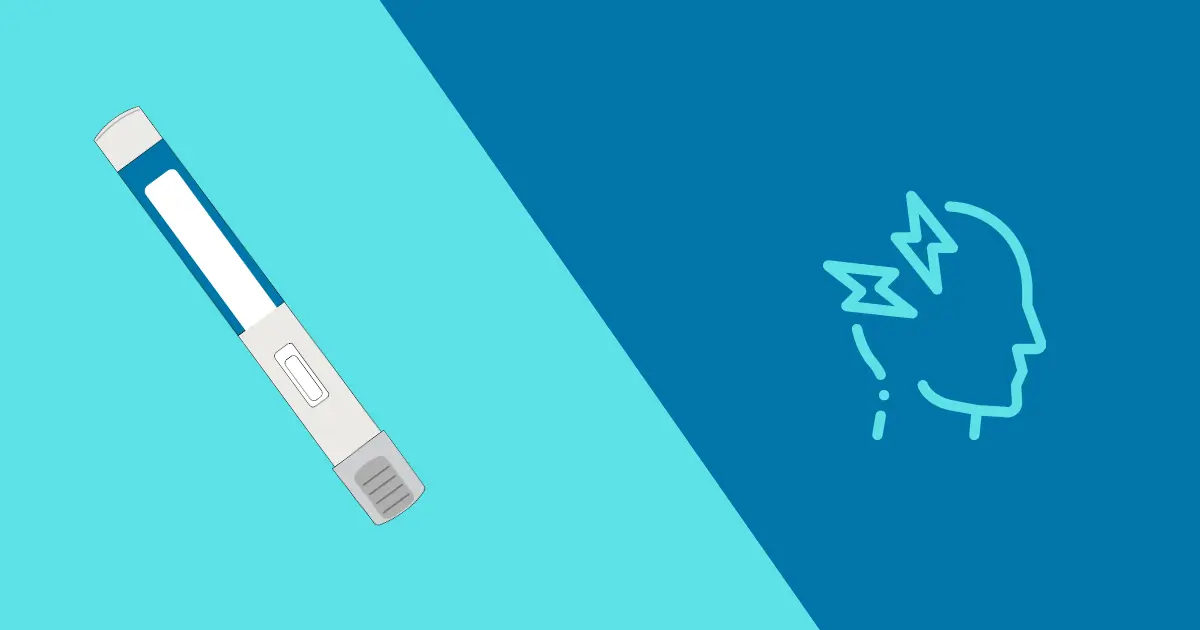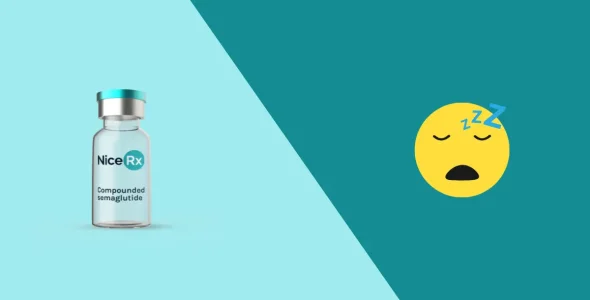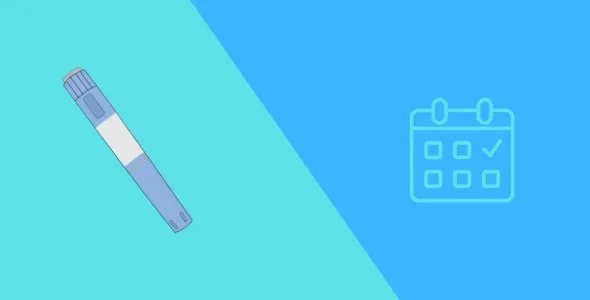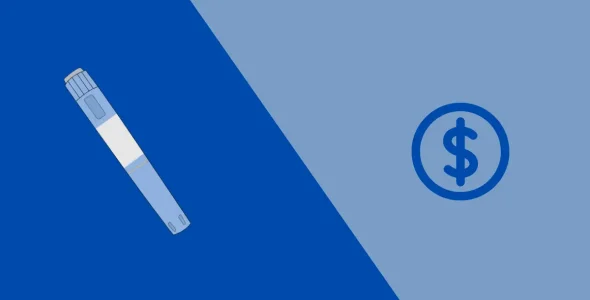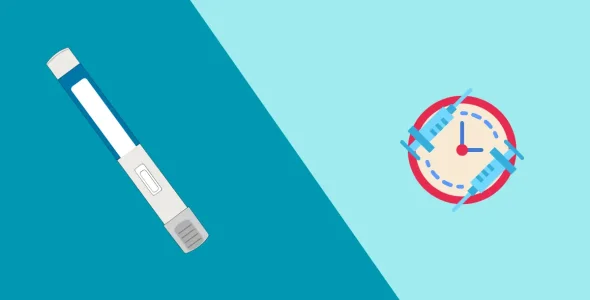Does semaglutide cause headaches? Why it happens and what to do
If semaglutide headaches are making you regret your weight loss shot, don’t give up yet. Doctors say this side effect is common—and often fixable with a few simple tweaks. Here’s what really works.
Key highlights
- Headaches are a common side effect of semaglutide that typically occur during the start of treatment or after a dose increase. Most of the time, these headaches are temporary and manageable.
- Semaglutide does not directly cause headaches. However, secondary factors like hypoglycemia, dehydration, gastrointestinal side effects, and vascular changes can trigger headaches.
- Most headaches are transient and improve within 2-8 weeks as the body starts to adjust to the physiological changes caused by the medication.
- Consult with your healthcare provider if you are experiencing a severe headache after each semaglutide injection or if you want to stop it.
Semaglutide does not directly cause primary headaches; they may arise secondarily due to hypoglycemia (low blood sugar level), dehydration, gastrointestinal side effects, and interaction of semaglutide with other medications.
Manufactured by Novo Nordisk, semaglutide is a GLP-1 receptor agonist (glucagon-like peptide-1) that is used to improve blood sugar control (Ozempic and Rybelsus) in individuals with type 2 diabetes mellitus and to support chronic weight management (Wegovy) in individuals who are obese or overweight. Ozempic and Wegovy are administered subcutaneously, while Rybelsus is taken orally.
Although semaglutide is highly effective, this medication can come with gastrointestinal side effects such as nausea, diarrhea, constipation, vomiting, and headaches. However, headaches are often indirect side effects that are manageable and frequently improve as the body adjusts to the medication.
Other possible side effects of semaglutide are stomach pain, gallbladder problems, inflammation of the pancreas (pancreatitis), vision changes, and increased risk of aspiration in procedures involving anesthesia. The medication is contraindicated in patients with a history of thyroid tumors, as it may increase the risk of thyroid cancer and MEN2 syndrome. These are rare but serious side effects of semaglutide.
This comprehensive guide explains why semaglutide might lead to headaches, how to manage them, and when it’s essential to seek medical advice. Additionally, it also explores troubleshooting steps you can take today to prevent headaches and identifies the red flags that indicate the need for urgent medical attention.
Does semaglutide cause headaches?
No, semaglutide does not directly cause headaches, but they may occur as a result of other side effects. Semaglutide is not known to directly trigger primary neurological headaches. Instead, the medication can contribute indirectly through mechanisms such as hypoglycemia (low blood sugar level), dehydration, or electrolyte imbalance from gastrointestinal side effects, and interactions with other medications.
Headache is one of the most common side effects in people who are taking semaglutide. According to a clinical trial, 14% of adults and 17% of adolescents (ages 12 and older) experienced headaches while taking Wegovy (2.4 mg weekly dose). In contrast, 10% of adults and 16% of adolescents experienced headaches while taking a placebo.
Typically, headaches come as an early side effect of semaglutide, particularly when you start the medication or increase the dosage. However, headaches are usually temporary and subside on their own as soon as the body starts to adapt.
How common are headaches on semaglutide?
Clinical trials indicate that 10-14% of the patients using semaglutide experienced headaches. However, the severity of headaches depends on the dosage and the body’s response to medication.
The clinical trials only show that headache can be a side effect of semaglutide, but they do not distinguish whether it is caused secondarily by another side effect or is directly associated with semaglutide use.
Mild and transient headaches are common while starting the medication. However, persistent and worsening headaches are less common with semaglutide and require evaluation by a licensed medical professional.
Why does semaglutide cause headaches?
Headaches with semaglutide typically occur secondarily due to the following factors:
Blood sugar fluctuations (hypoglycemia)
Semaglutide is an FDA-approved medication that is used to manage blood sugar levels by enhancing insulin secretion and delaying gastric emptying. However, when this medication is combined with other glucose-lowering medications, such as insulin and sulfonylureas, or you skip a meal, semaglutide can cause a rapid drop in blood sugar levels that can lead to headaches.
Hypoglycemia is a common trigger for headaches. The signs and symptoms of hypoglycemia (low blood sugar levels) are:
- Blurry vision
- Rapid heartbeat
- Sweating
- Hunger
- Irritability
- Lethargy
- Hunger or nausea
- Confusion
- Looking pale
- Shakiness
- Difficulty in concentration
- Tingling or numbness in the lips, tongue, and cheeks
As hypoglycemia becomes worse, you may experience these symptoms:
- Confusion
- Loss of coordination
- Slurred speech
- Nightmare
- Seizures
If you experience headache, lightheadedness, and sweating after injection or after heavy exercise, it may indicate that you have hypoglycemia-induced headache.
Check your blood sugar levels regularly if you experience headaches or other hypoglycemia symptoms. Keep glucose tablets along with you or carry a snack to prevent hypoglycemia promptly. Consult with your healthcare provider if you frequently experience episodes of hypoglycemia; they will make necessary changes in your dosage accordingly.
Dehydration and electrolyte loss
Semaglutide does not directly cause dehydration. However, some indirect pathways can lead to dehydration. These include:
- Reduce appetite and fluid intake: Semaglutide suppresses the appetite, and you may unintentionally consume less fluid, which can lead to dehydration and electrolyte imbalance.
- Slow gastric emptying: This medication also slows gastric emptying, which reduces hunger and can diminish thirst cues, leading to dehydration.
- Gastrointestinal side effects: Semaglutide can cause gastrointestinal side effects such as vomiting, diarrhea, and nausea that cause direct fluid loss and electrolyte imbalance, which may lead to dehydration.
When the body is dehydrated, it causes the brain tissues to shrink, which puts pressure on the surrounding pain receptors, resulting in headaches.
Dehydration-related headaches can be mild or severe and vary from individual to individual. You may feel pain in your whole head or at one point of your head, like the front, back, or one side of your head.
Dehydration not only causes pain in your head. Other symptoms of dehydration include:
- Loss of appetite
- Dry mouth
- Darker urine
- Fatigue and lethargy
- Body aches
The practical signs of dehydration are dark urine, dry mouth, and sunken eyes. In severe cases, it may cause confusion and loss of consciousness.
GoodRx explains that GLP-1 medications, such as semaglutide, can increase the risk of dehydration, especially when followed by gastrointestinal side effects such as vomiting or diarrhea and appetite suppression. Therefore, GoodRx emphasizes staying well-hydrated and drinking plenty of water throughout the day to prevent dehydration.
The following are a few tips to stay hydrated throughout the day;
- Drink sips of water throughout the day, even if you don’t feel thirsty.
- Use electrolyte replacement such as ORS to meet electrolyte requirements.
- Consult with your healthcare provider to adjust the dose or prescribe an over-the-counter medication if the symptoms are severe.
Vasolidation
GLP-1 receptor medications such as semaglutide also have vasodilatory effects on blood vessels (widening of blood vessels). This may widen blood vessels in your brain that can lead to a headache similar to other vasodilatory drugs, such as nitrates.
Body adjustment period and transient side effects
When you start taking semaglutide or increase the dosage, your body goes into physiological adjustment, as it adapts to changes in appetite, digestion, blood sugar levels, and metabolism. You may experience a cluster of side effects during the first few weeks, such as nausea, vomiting, diarrhea, and headaches.
These symptoms are usually temporary and resolve on their own when your body becomes accustomed to the medication. Therefore, slow titration and following your healthcare provider’s dosage schedule can help you reduce the intensity and duration of the symptoms.
Other potential factors
Headaches are more common in the general population, so some occurrences may be coincidental or related to other underlying conditions, such as stress, poor sleep, caffeine withdrawal, or migraines.
Moreover, other glucose-lowering medications, such as insulin and sulfonylureas, changes in caffeine and alcohol intake, and sleep disturbances during weight loss can trigger headaches.
The following are a few tips to manage semaglutide-associated headaches:
- Review your medications with your healthcare provider.
- Limit or maintain your caffeine intake.
- Maintain your sleep hygiene.
- Keep a record of your headaches, including triggers and severity, which helps your healthcare provider distinguish between semaglutide-related headaches and other potential causes of headaches.
How long do semaglutide headaches last?
Headaches mostly occur during the first few days to weeks after starting semaglitide or after dose escalation. Headaches usually appear within 24-48 hours of administering semaglutide.
For most people, these headaches usually resolve in 1-4 weeks as the body adjusts. However, if the headache persists beyond 4-6 weeks, consult with your healthcare provider. They will investigate the cause of the headaches and treat them accordingly.
A gradual increase in semaglutide dose helps reduce the severity of the side effects. Common dosing schedules include:
- 0.25 once weekly for 4 weeks
- 0.5 mg once weekly for the next 4 weeks
- 1 mg once weekly for the next 4 weeks
- Higher doses (1.7 mg and 2.4 mg for Wegovy and 2 mg for Ozempic) are administered afterwards if further glycemic control or weight loss is needed. These doses are initiated after careful dosage titration to minimize side effects.
Always stick to your dosing schedule provided by your healthcare practitioner to avoid potential side effects. Consult with them if you have severe or persistent side effects; they will adjust the dose accordingly.
How to manage and prevent semaglutide headaches
Semaglutide headaches are easily manageable if you don’t have any other underlying conditions that can contribute to headaches. You can manage semaglutide headaches in the following ways:
Hydration and electrolyte balance
Dehydration and electrolyte imbalance can trigger headaches. As semaglutide suppresses appetite and causes gastrointestinal side effects such as diarrhea and vomiting, the medication may lead to dehydration, resulting in headaches. Follow these tips to keep yourself hydrated and to prevent electrolyte imbalance:
- Drink plenty of water regularly throughout the day, even if you are not thirsty. Take small sips if you feel nauseated.
- If vomiting or diarrhea occurs, add low-sugar electrolyte drinks or oral rehydration solutions to restore fluid and electrolyte balance.
- Set a daily reminder on your cellphone to drink a glass of water every few hours.
- Avoid excessive alcohol intake, as alcohol can worsen dehydration and headaches
You can make a homemade hydration solution to prevent electrolyte imbalance and dehydration.
Mix the following ingredients to make the homemade electrolyte water:
- 2 cups of water
- 1 cup unsweetened coconut water
- Juice of ½ lemon or lime
- Pinch of sea salt
- (Optional): a few drops of stevia for taste)
You can make a citrus salt rehydration mix by combining these ingredients:
- 3 cups water
- Juice of 1 orange + ½ lemon
- ¼ tsp sea salt
- 1 tsp honey (optional, very small amount for flavor)
Berry-infused water can be made by mixing:
- 1 quart of water
- Handful of fresh berries (blueberries, raspberries, or strawberries)
- Pinch of salt
- Fresh mint leaves (optional
Carry a water bottle, set reminders, and consider electrolyte-rich fluids if you are experiencing gastrointestinal issues that may cause dehydration.
Blood sugar management through dietary adjustments
You can manage your blood sugar levels by following dietary options like:
- Eat a regular, balanced meal and avoid skipping meals to avoid hypoglycemia.
- If you are on glucose-lowering drugs and experience hypoglycemia, immediately take glucose tablets or ampules, or sugar-containing juices to quickly boost your blood sugar levels
- Check your blood sugar levels when you have drowsiness, headache, shakiness, or blurry vision, as these symptoms indicate hypoglycemia.
- If blood sugar levels are below 70 mg/dl, immediately take glucose tablets or ampules or visit the nearby healthcare facility to receive emergency care. If it is more than 200 mg/dl along with hyperglycemia symptoms, consult with your healthcare provider as soon as possible.
- Choose complex carbohydrates such as whole grains, vegetables, and legumes instead of refined sugars.
- Combine carbohydrates with healthy fats and lean proteins to avoid a post-meal blood sugar spike.
- Keep a consistent meal schedule to avoid blood sugar fluctuations.
- Monitor your blood sugar levels regularly if you are on glucose-lowering medications to avoid complications and side effects.
Over-the-counter pain relief
Your doctor may also recommend over-the-counter pain relief medications to manage headaches. These may include acetaminophen (Tylenol) and ibuprofen (Advil, Motrin).
Acetaminophen is usually recommended because it is gentle on your stomach. NSAIDs may also help relieve pain, but they can irritate your stomach and kidneys, especially in patients with stomach pain and kidney problems.
You can use OTC pain relievers like acetaminophen or ibuprofen unless contraindicated. You should not take these medications if you have pre-existing kidney diseases, stomach problems, or if there is a risk of interaction with other medications. Consult with your healthcare provider before starting any new medications, particularly if you are on another prescription or have chronic health conditions.
Gradual dose increases
Semaglutide works by regulating your body’s sugar levels, metabolism, and appetite. Therefore, increasing the dose too quickly can cause severe side effects such as headache, nausea, vomiting, and diarrhea.
Your healthcare provider will increase the semaglutide dose step-by-step to help your body adapt and reduce the risk of side effects. Always follow your doctor’s prescription if you are on semaglutide or other glucose-lowering medications.
Sleep and stress management
Headaches are usually worsened by muscle tension or muscle spasms and stress. Practising relaxation techniques such as yoga, gentle stretching, deep breathing, and meditation helps reduce muscle tension and relieve headaches.
Sleep is very important for relieving and preventing headaches. A poor sleep routine can trigger headaches or worsen them. Sleep at least 7-9 hours per night and limit your screen time before going to bed.
Stress can also trigger or intensify headaches. Therefore, practising techniques like yoga, mindfulness, and meditation can help reduce stress-induced headaches.
Regular physical activity
Regular physical activity is also important in managing your blood sugar levels. Moderate exercises, such as walking, cycling, and light strengthening, can help reduce stress and lower the risk of headaches.
Avoid excessive activity such as high-impact exercise (weight lifting) that can increase the risk of dehydration and hypoglycemia, especially when combined with glucose-lowering medications.
Caffeine management
Caffeine management is very important when dealing with semaglutide-associated headaches. Consuming too much or cutting caffeine abruptly can trigger headaches. A moderate and consistent caffeine intake, such as one cup of tea or coffee daily, is considered safe and may help you relieve headaches. In contrast, excessive caffeine intake can worsen headaches.
When to see a doctor?
Mild headaches are common while taking semaglutide and resolve on their own. You should visit your healthcare provider if you experience the following signs.
- Persistent or severe headaches that worsen over time and do not improve with rehydration, rest, and over-the-counter medication.
- Headache with blurry vision, double vision, or ocular migraines.
- Headache with nausea and vomiting.
- Headaches with neurological symptoms like confusion, dizziness, and difficulty speaking.
- Signs of severe hypoglycemia, such as confusion, shakiness, sweating, and tremors.
- Allergic reaction after administration of the medication.
When can you stop the medication?
Do not stop the medication on your own. Consult with your healthcare provider and discuss your signs and symptoms. Your healthcare provider may ask you to stop the medication if you experience the following symptoms:
- If headaches are more frequent and affect your quality of life.
- If they occur constantly after each dose.
- If the side effects of semaglutide are unmanageable.
- If you have a history of migraines, and semaglutide is triggering them.
What may your healthcare provider ask?
Your healthcare provider may ask you the following questions to understand your problem. This includes:
- When does your headache start, and how long does it last?
- Are your headaches associated with nausea, vomiting, changes in vision, or low blood sugar?
- Are there any triggers or relieving factors of your headache?
- How much water do you drink daily?
- Are you taking any other medicine or supplements?
Your healthcare provider may also recommend some tests. These include:
- Blood sugar level to rule out hypoglycemia.
- Metabolic profile to assess kidney function and serum electrolyte levels.
- Pregnancy test for women if required.
- Imaging studies to assess if there are red flags like severe headache, vision loss, or confusion.
How to prepare for the appointment:
Before consultation with your healthcare professional, prepare yourself in the following way:
- Keep a record of your symptoms or side effects for one week.
- Track your blood sugar levels regularly and record them.
- Bring the medication that you are taking along with semaglutide and your previous medical records.
- Track your hydration and caffeine intake.
Always have an open communication with your healthcare provider so they can evaluate and decide whether the headache is a common side effect or associated with any serious health problems. They will also adjust the dosage of semaglutide if needed.
Do semaglutide headaches go away over time?
Many people report that headaches from semaglutide are usually temporary and resolve on their own. Some patients notice a decrease in headache after 2-8 weeks. However, if the blood sugar levels and hydration status are maintained, headaches begin to resolve or become easier to tolerate.
Semaglutide headache FAQs
Does semaglutide directly damage the brain or cause migraines?
No, semaglutide does not directly damage the brain or cause migraines. The medication may trigger headaches indirectly by lowering blood sugar levels, dehydration, or vascular changes.
How long after an injection will a headache start?
A headache can start at any time after an injection within hours, days, or weeks. However, this may happen during the first few weeks of the treatment or after a dose increase.
Are headaches more common with Wegovy or Ozempic?
Headaches are more common with Wegovy as Wegovy has higher doses compared to Ozempic. There are more chances of hypoglycemia and associated side effects, such as headaches, at higher doses.
Should I stop semaglutide if I get headaches?
No, you should not stop the medication if you get headaches. Headaches are usually temporary and subside on their own. However, if you experience severe side effects and persistent headaches that don’t get relieved with lifestyle and dietary modification, consult with your health care provider. They will adjust the dosage and guide you on how to manage headaches. They may also prescribe you some over-the-counter medications.
Can I take ibuprofen/acetaminophen with semaglutide?
Yes, you can take ibuprofen/acetaminophen for a headache while taking semaglutide. There is no direct interaction between these medications. However, if you have stomach problems, it is better to take acetaminophen instead of ibuprofen, as NSAIDs should not be taken with preexisting stomach problems. It is better to consult with your healthcare provider before starting any new medication with semaglutide.
When should I go to the ER?
You should go to the emergency department if you experience the following symptoms:
- Severe and sudden headache
- Headache with vision changes
- Persistent vomition
- Persistent nausea
- Persistent diarrhea
Are there natural remedies for semaglutide headaches?
Yes, there are various natural remedies available to help manage semaglutide-related headaches. These are:
- Stay hydrated throughout the day.
- Don’t skip meals.
- Eat in smaller portions but more frequently to prevent hypoglycemia, which causes headaches.
- Avoid caffeine around bedtime and sleep for at least 6-8 hours every night to prevent headaches.
- Consume magnesium-rich foods such as leafy green vegetables (spinach, kale), legumes, and nuts.
- Avoid stress and try meditation or stress reduction techniques.
- Try cold and warm compresses to reduce headaches.
Does caffeine help or worsen semaglutide headaches?
Consuming caffeine sometimes helps semaglutide-related headaches because it can narrow the blood vessels and may relieve the tension. In contrast, too much caffeine can worsen the headache by causing dehydration because caffeine can disturb your sleep cycle and can also trigger headaches.
Conclusion: Understanding, managing, and preventing headaches while on semaglutide
Headaches can happen while taking semaglutide, but they are manageable and are often associated with dehydration and hypoglycemia (low blood sugar level). They usually occur when you start taking semaglutide or increase its dosage during the titration phase. You may experience a decrease in pain intensity as your body starts to adjust. Dietary and lifestyle modifications are also helpful in preventing semaglutide-associated headaches.
Adequate hydration, optimal blood sugar levels, stress management techniques, healthy sleep cycle, and a healthy lifestyle can also be helpful in managing headaches associated with semaglutide.
If you experience severe and persistent side effects and headaches while taking semaglutide that do not go away with lifestyle changes and over-the-counter medications, have an open communication with your healthcare provider. Discuss your health-related concerns. They may adjust your dosage or switch to an alternative medication, such as Mounjaro, Zepbound, or others, if necessary.
